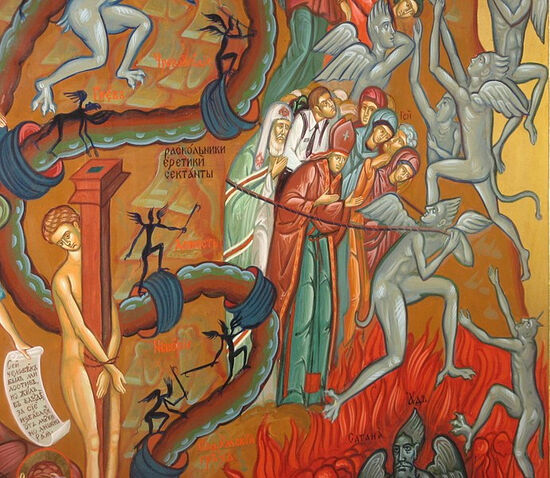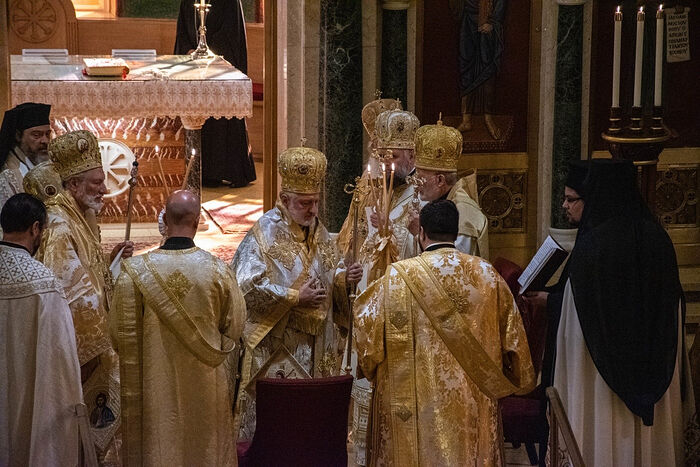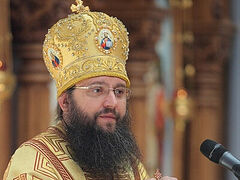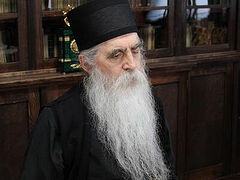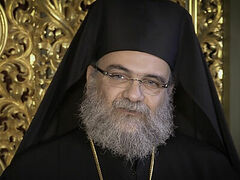Rebellion against the rightful authority is a sin to the utmost degree, according to Prophet Samuel: For rebellion is as the sin of witchcraft, and stubbornness is as iniquity and idolatry (1 Kings 15:23).
Bishop Vissarion (Nechaev)1
The events of the recent years clearly demonstrate what bitter consequences the Church is to face as a result of the sin of schism and attempts of its legalization.
Why do people refuse to see themselves as schismatics? Because many people simply have no idea what schism is about.
We are witnessing a disastrous kind of dual consciousness, when those who accepted the Ukrainian schismatics into communion are saying that no “Kiev Patriarchate” has ever existed (which is essentially true!), while the ones they communed with are serving panikhidas for “Patriarch Vladimir” (Romanyuk).
Why do people refuse to see their schismatic state? The fact of the matter is that beyond certain spiritual reasons that are to be resolved by spiritual fathers, many of them simply don’t know what is schism.
We present an opportunity to decode it.
The first definition of schism is offered in the First Canon of Holy Hierarch Basil the Great:
Schisms is the name applied to those who on account of ecclesiastical causes and, remediable questions have developed a quarrel amongst themselves.
As an example, Holy Hierarch Basil cites “Cathari, Encratites, and Hydroparastatae, and Apotactitae,”—all those who not only fell away from the Church but also stuck to certain heretical opinions.
In a different sense, schismatics are described in the Rules 13-15 of the First-Second Council:
So that in case any Presbyter or Bishop or Metropolitan dares to secede or apostatize from the communion of his own Patriarch, and fails to mention the latter’s name in accordance with custom duly fixed and ordained, in the divine Mystagogy, but, before a conciliar verdict has been pronounced and has passed judgment against him, creates a schism, the holy Council has decreed that this person shall be held an alien to every priestly function if only he be convicted of having committed this transgression of the law.
Summarizing the two definitions above, the renowned Patriarch Dositheos (Notaras) of Jerusalem says that the first rule describes heretics in schism, whereas the latter speaks of schism as “pure apostasy.” What unites them is that “any schism has to do with disobedience.”2 It is also confirmed by the respected canonist, Holy Confessor Nikodim (Milaš):
“Schism consists of the refusal of certain people to be in obedience to lawful hierarchy… for instigating the schism, (the canons) subject the clergymen to defrocking while the laity are excommunicated for falling into schism.”3
This definition, as confirmed by many practical experiences in the life of the Church, raises the following issues for us to consider:
-
What is obedience to the lawful hierarchy specifically?
-
Who is specifically the lawful hierarchy?
-
What are the consequences, from the perspective of being a part of the Church, of falling into schism?
A question of obedience
In essence, it is already defined in the above-mentioned canonical rule of Holy Hierarch Basil as it speaks of “opinions on church matters.” The Russian Synod needed to describe it in greater detail in the Ecclesiastical Regulation dated 1721.
The Decree states that, above things obligatory for the Christian, and others, unacceptable to the Christian, there are also other things – secondary in nature:4
As for the things secondary in nature we here-hence perceive: Anything contained in the Holy Scripture and important decisions of the councils of the Holy Church or the well-known Church tradition is neither legalized nor repudiated.
These secondary matters are the ones that are subject to transformation and direction on the part of Church hierarchy: They are established and revoked “by the higher clergy, the councils, and conciliar gatherings with the grace of the Church authorities.”
This specific regulation’s immediate task was to explain what the schism of the Old Believers was about and why Patriarch Nikon’s revision of the service books was within the law. But it is not too difficult to see that the schisms of today, motivated by nationalistic sentiment and zealous instincts, cannot possibly claim that if they are in disobedience, it has to do with something “legalized, based on Scriptures and significant councils.”
The lawful Church authority
The canons clearly denote that the power within the diocese belongs to the bishop. Who is superior to the bishop?
Canon law as a whole is permeated with the principle called synodality
Many will say that Patriarch is the one who is superior to the bishop. This is not exactly so. All of canon law is permeated with the principle of synodality and it comes down to the fact that the assertions on levels higher than a diocese are not to be adjudicated single-handedly (Canon 34 of the Apostolic Canons):
But neither let him (who is the first) do anything without the consent of all.
It is important to underline that the canons suggest the participation of all bishops, not all the faithful in general.
In the Churches headed by Metropolitan (for example, in the Church of Poland, the Church of the Czech Lands and Slovakia, as well as de facto the Church of Cyprus, even though its head bears the title of Archbishop), the decisions appertain to the Council of Bishops of the Metropolia.
In the Patriarchates, the Patriarch and the Holy Synod or fully-convened Bishops’ Council is ranked higher than Metropolitans (comp.: First Universal Council, Rule 6, Fourth Universal Council, Rule 9, and Rules 5, 6, 17 of Chapter 3 of the Statute of the Russian Orthodox Church). Before the creation of the orderly system of Patriarchates, Metropolitans were judged by the Metropolitans from neighboring jurisdictions—so that the principle of synodality wasn’t violated (Third Universal Council 1, comp: Carth. 11).
Finally, the Universal Church is above the patriarchates and all Local Churches. As Holy Hierarch Meletius (Pigas) the Patriarch of Alexandria writes,
The Patriarchal throne yields to no one but the Universal Church.5
This principle applies to all Churches and, against Roman Catholic objections, in the first millennium (while the West was still Orthodox) the Eastern and the majority of Western Church fathers viewed the primacy of the Bishop of Rome within the framework of this particular principle.
Thus, Blessed Augustine, speaking of the trial of Pope Melchiades of Rome, says:
Well, let us suppose that those bishops who decided the case at Rome were not good judges; there still remained a plenary Council of the universal Church, in which these judges themselves might be put on their defense so that, if they were convicted of mistake, their decisions might be reversed.”6
The proceedings against Patriarch Nikon illustrate the point well.7 The Eastern patriarchs asked Nikon: “Who will judge the bishop—and who is the patriarch’s judge?” Nikon replied: “A bishop will be judged by twelve bishops, while a patriarch will be judged by the whole universe! (or, obviously, the Ecumenical Church).” But this was exactly what the Eastern patriarchs were waiting for him to say! Upon hearing his response, they immediately accused him of single-handedly condemning Bishop Paul of Kolomna. It is worth noting that the two patriarchs who judged Nikon took heed to get the consent of two remaining patriarchs so that Nikon was practically judged by the “whole universe” (including, by the way, the Russian bishops).
The fact that it was so hard to bring a patriarch to justice was one of the reasons for the abolition of the Patriarchate and the establishment of the Holy Synod in Russia. “The Ecclesiastical Regulation” that was to determine the life of the Russian Church for the next two hundred years has expressed it quite candidly: 8
Why should there be a need to summon the Universal Council for such a wicked autocrat presenting such great difficulty and to incur a considerable expense for our homeland when, in current times (when the Eastern Patriarchs live under Turkish rule, and the Turks are wary of our State—even more today than before), that it is deemed nearly impossible.
The Bishops’ Council is the supreme authority for a Local Church and the only authority ranking higher is the opinion of the Universal Church
In summary, the Bishops’ Council of the Local Church is its supreme authority with the exception of the opinion of the Universal Church, which ranks higher. Therefore, our bishops, who are not condemned by either the Bishops’ Council or the collective decision of the Local Churches, are the lawful Church authority on the canonical territory of the Russian Orthodox Church. By contrast, the condemned bishops and former bishops such as Filaret (Denisenko), Diomid (Dziuban), and more recently, Simeon (Shostatsky), possess no canonical authority by becoming the schismatics.
The consequences of schism
The first and the most obvious consequence of schism is that a schismatic falls away from the Church.
“Do not err, my brethren! If any man follows him that makes a schism in the Church, he shall not inherit the kingdom of God,” warns Hieromartyr Ignatius the God-Bearer as early as the beginning of the second century (To the Philadelphians, 3).
Hieromartyr Irenaeus, Bishop of Lyons, the disciple of the Apostles’ disciple, says:
“Christ will judge those who create a schism, who have no love of God and look after their interests more than the unity of the Church, and, either for reasons of little importance or random causes, split and tear the great and glorious body of Christ.”9
Holy Hierarch John Chrysostom spoke even more powerfully about it:
Truly, I say and testify that to cause divisions in the Church is no lesser evil than falling away into heresies… What Gehenna befits the one who slaughters Christ Himself and tears Him up to pieces? Is it the one by whom we are menaced? It seems to me it is another Genenna, even more vehement than that.10
Correspondingly, prayer (let alone full communion) with schismatics is prohibited. A question of punishment for entering into prayerful and liturgical communion with the schismatics, on a stand-alone basis, has not been addressed in the canons of the Church, but what we face today is a single case of a general matter—prayer or full communion with those who were excommunicated or defrocked:
-
Apostolic Canon 10: “If any one shall pray, even in a private house, with an excommunicated person, let him also be excommunicated.”
-
Apostolic Canon 11: “If any clergyman shall join in prayer with a deposed clergyman, as if he were a clergyman, let him also be deposed.”
-
Synod of Antioch Canon 2: “If any one of the bishops, presbyters, or deacons, or any one in the Canon shall be found communicating with excommunicated persons, let him also be excommunicated, as one who brings confusion on the order of the Church.”
The departure from the Apostolic canon—entering into communion with schismatics—was what has led to the current turmoil in universal Orthodoxy
We can see that it was exactly the departure from this Apostolic canon—entering into communion with schismatics—that has led to the current turmoil in universal Orthodoxy. On the other hand, the principle of non-participation in mutual prayer with heretics and schismatics, driven to extremity, is often used as an excuse for new schisms.
Thus, we can often hear things like: “Whoever prays with a heretic is heretic himself!” or “Whoever prays with a schismatic is a schismatic himself!” This principle sounds simple and quite tempting—yet it is false!
If we address Apostolic canons 10 and 11, we will see how, on the one hand, they imply that a guilty person should be “excommunicated” and “deposed,” but on the other hand, these words are preceded by the “let him be” in the imperative case. In canon law, it indicates the necessity of delivering them to lawful judgment by the corresponding ecclesiastical court.
The second canon of the Council of Antioch affords grounds for breaking communion with a bishop who entered into communion with the schismatics and heretics, yet in this instance, the culpability of the one who entered into communion with the excommunicated is phrased as, “bringing confusion on the order of the Church,” but not “schism” by any means. Please note that the third canon of the Council of Antioch uses an identical notion of “disorder” describing the situation when either a presbyter or a deacon has forsaken his own parish and does not return upon the bishop’s urge to do so. Likewise, in the thirteenth canon, the same term is used to describe a situation when the bishop proceeded to conduct the ecclesiastical affairs and ministry in another diocese without a local bishop’s consent. It is apparent that these cases cannot be assumed to be equivalent to schism.
Here is another illustrative example: Holy Hierarch Ambrose, bishop of Milan, wrote in defense of Maximus the Cynic, calling him a bishop of Constantinople.11 Meanwhile, just a year later, the Second Ecumenical Council ruled that Maximus was not only not the bishop, but he had never been one, remaining a member of the laity and a schismatic (besides, he was in schism together with St. Gregory the Theologian, one of the greatest archpastors of the Church).
Clearly, Holy Hierarch Ambrose was mistaken in defending Maximus. But wouldn’t it be too far a stretch to say that he fell away in schism?
Therefore, with all harshness of the canonical sanctions for mutual prayer with heretics and schismatics, they don’t initiate a “chain reaction.” For this reason, the Russian Church, protecting itself by its rule against communion with those who concelebrated with the schismatics, has justifiably preserved communication with the Local Churches (and even separate hierarchs) who concelebrate with those concelebrants (all the while not having any communication with the schismatics themselves).
Archbishop Elpidophoros (Patriarchate of Constantinople) concelebrating with Metropolitan Joseph (Patriarchate of Antioch), Bishop Irinej (Serbian Patriarchate), Metropolitan Tikhon (Orthodox Church of America). October 2021.12
On divisions
It is worth noting that, once in a while, by extension, the word “schism” has come to mean such situations when each divided party remains a part of the united Church.
For example, the Slavic translation of the canon 114 of the Council of Carthage refers to the argument among the bishops of Rome and Alexandria as “schism”13 even though all Byzantine exegeses unanimously call it simply a “dissension.” Holy Hierarch Ignatius (Brianchaninov) calls the Edinovertsy or Old Believers (that is, the members of the Church who, with the permission of the Synod, hold to the liturgical practices in use before Patriarch Nikon’s reforms) and the “Churches officially under the authority of senior priests” (that is, churches on military bases) as schismatics.14 Understandably, what he means here is the disobedience of such parishes to bishops of its diocese, but not to the Church as a whole.
Accordingly, what in fact is meant here isn’t “schism” but “division”, when two parties remain in a canonically abnormal relationship: There is neither full communion between equals nor commemoration and obedience from the dependent. However, there is no decision in this regard on the part of the lawful Church authority.
It would be also fair to say that among such divisions was the pre-war dissociation of Patriarch Sergius and the so-called “right opposition” in our Church. The canonicity of the election of Patriarch Sergius was hardly in evidence. When, with the obvious consent of the majority of bishops, Alexiy I took his place, St. Athanasius (Sakharov), a Confessor of the faith, responded in the following manner: 15
No lawful supreme hierarchical authority has condemned Patriarch Alexiy… This is why in 1945, while still in prison, I and those priests with me who did not commemorate Metropolitan Sergiy, after learning of the election and enthronement of Patriarch Alexiy unanimously agreed that since there was no other lawful First Hierarch of the Russian Orthodox Church besides Patriarch Alexiy, who was recognized by all the Ecumenical Patriarchs, resolved to commemorate him in our prayers as our Patriarch. And since that day, I continue to do so without any hesitation.
It becomes clear why Holy Hierarch Athanasius is speaking here about the recognition by “all the Ecumenical Patriarchs.” Because all of them collectively voice an opinion of the Universal Church that served for Patriarch Alexiy I, just as for any other patriarch or pope, “the lawful supreme hierarchical authority.”
Subjection to the lawful Church authority is more important than any political differences of opinions
We can only imagine what St. Athanasius, a bishop who endured bonds and hard labor for his beliefs, felt when he was writing about it. Holy Hierarch Athanasius wasn’t basically in schism. Yet, we hope that his example can show something to those residents of Ukraine who unfortunately remain in schism about the importance of being subject to the lawful Church authority, which is more important than any political differences of opinions.

